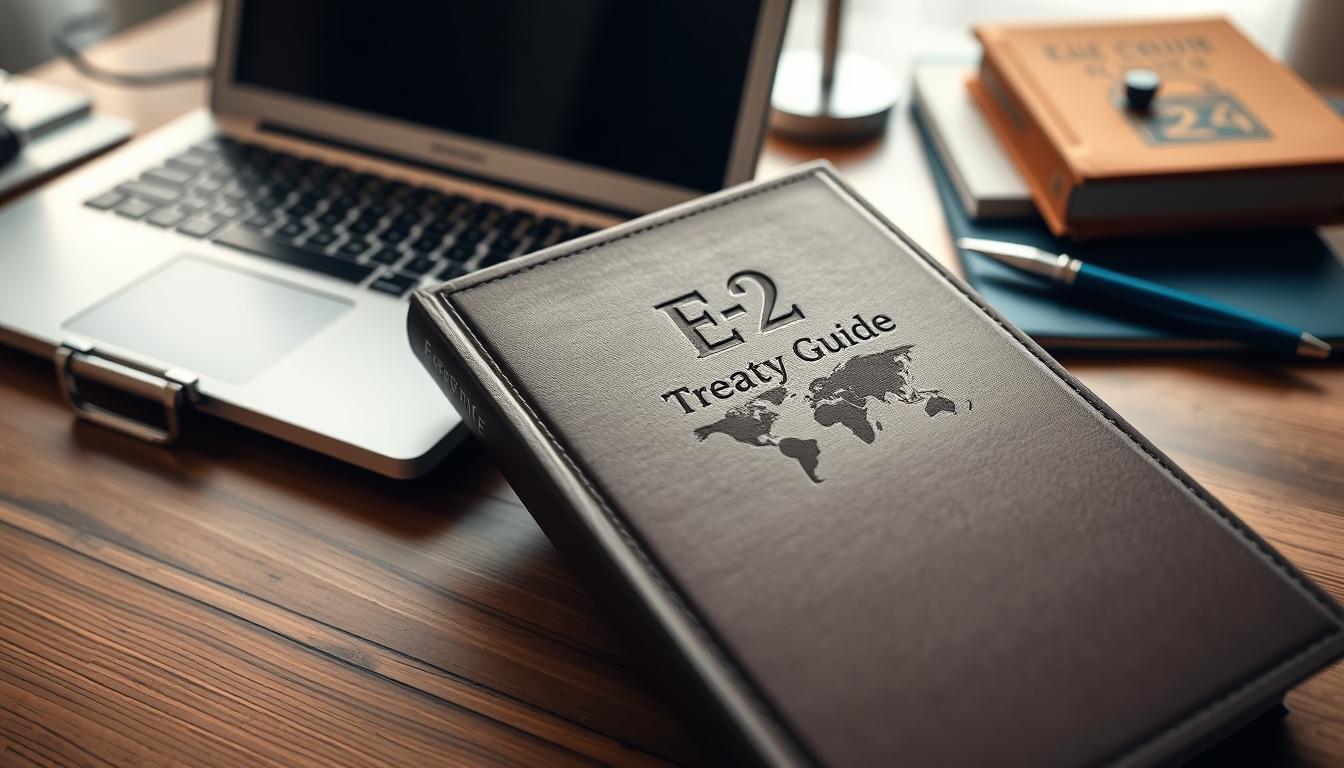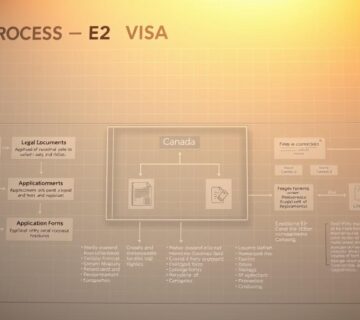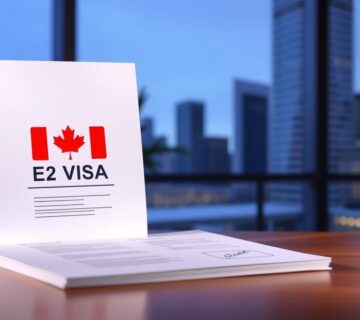Table of Contents
The E-2 Treaty Investor visa is one of the most attractive options for Canadian citizens who want to live and work in the United States while running a business. Unlike permanent immigration programs, the E-2 is a non-immigrant visa, meaning it allows applicants to reside in the U.S. for renewable periods as long as their business continues to operate successfully.
For Canadian entrepreneurs and investors, this visa is particularly valuable because it builds on the strong economic and trade relationship between Canada and the United States. With the right preparation, an E-2 visa can allow Canadians to establish new ventures, purchase existing businesses, or expand franchises into the U.S. market.
The E-2 visa does not require a specific investment amount set by law, but applicants must demonstrate that their investment is substantial, at risk, and sufficient to support a viable business. This flexibility makes it a popular choice for Canadian small-business owners, family-run companies, and larger investors alike.
In this guide, we’ll cover everything Canadian applicants need to know about the E-2 visa, including eligibility requirements, treaty country rules, investment guidelines, the application process, and options for employees and family members. By understanding these essentials, you’ll be better equipped to decide whether the E-2 visa is the right pathway for your U.S. business expansion.
What Is the E-2 Visa?
The E-2 Treaty Investor visa is a U.S. non-immigrant visa designed for nationals of countries that have a qualifying treaty of commerce and navigation with the United States. It provides an opportunity for foreign investors to live and work in the U.S. while managing or developing a business in which they have invested.
For Canadian citizens, the E-2 visa is particularly relevant because Canada has maintained a treaty with the United States since January 1, 1993, making Canadians eligible applicants.
Key Features of the E-2 Visa

- Investor-focused: Applicants must show that they have made, or are actively in the process of making, a substantial investment in a U.S. business.
- Business management role: The investor must direct, develop, or oversee the enterprise, rather than being a passive shareholder.
- Non-immigrant status: Unlike permanent residency visas, the E-2 does not provide a direct path to a green card. However, it can be renewed indefinitely, as long as the business continues to operate and meet requirements.
- Family benefits: Spouses and unmarried children under 21 may obtain dependent visas, with spouses eligible to apply for U.S. work authorization.
- Flexibility: Holders can travel freely in and out of the United States during the validity of their visa.
Who Typically Uses the E-2 Visa?
The E-2 visa is widely used by:
- Canadian entrepreneurs starting a new business in the U.S.,
- Canadian investors purchasing an existing business or franchise, and
- Canadian small business owners seeking to expand operations across the border.
Because the U.S. has no set minimum investment threshold, the E-2 visa offers flexibility to both large-scale investors and smaller enterprises, provided the investment is sufficient to create a viable business that goes beyond a marginal operation.
One of the most important aspects of the E-2 visa is that it is only available to nationals of certain countries that have signed a treaty of commerce and navigation with the United States. These agreements outline the rights of investors and traders to conduct business across borders, forming the legal foundation of the E-2 program.
Canada’s Treaty Status
Canada’s treaty with the United States came into effect on January 1, 1993. This treaty allows Canadian citizens who meet the investment and management requirements to apply for the E-2 visa. Because of the long-standing trade relationship between the two countries, Canadians are among the most frequent users of the E-2 visa category.

Other Treaty Countries
More than 70 countries worldwide currently qualify for the E-2 visa. These treaties vary in their details, including:
- Visa validity periods (ranging from one to five years, depending on the country);
- Reciprocity fees, which may apply to some nationalities but not others (Canada currently has no reciprocity fee);
- Special conditions or exceptions, such as restrictions on certain territories or additional requirements for employees.
For example:
- Australia has an E-2 treaty effective December 27, 1991, with a five-year visa validity.
- Japan has had a treaty since 1953, also allowing five-year validity.
- Some countries, like Ecuador, previously had treaties but lost eligibility when the agreement was terminated in 2018.
Eligibility Criteria for Applicants
To qualify under the treaty rules, applicants must:
- Be a citizen of a treaty country (permanent residents of treaty countries do not qualify unless they hold citizenship);
- Invest in a bona fide U.S. business;
- Demonstrate at least 50% ownership or control of the business;
- Show that the business is not marginal—it must generate income beyond simple subsistence.
Why Treaty Status Matters
Because treaties can be amended or terminated, applicants should always confirm their country’s eligibility before preparing an application. For Canadians, the treaty has remained stable since 1993, making the E-2 a reliable option for entrepreneurs and investors planning U.S. expansion.
Investment Requirements
There is no fixed minimum investment amount under U.S. immigration law. However, investments must be:
- Substantial relative to the total cost of the business;
- At risk, meaning committed and subject to potential loss;
- Sufficient to ensure the enterprise is more than a marginal business (able to generate income beyond minimal living expenses).
Amounts in the range of $100,000 to $200,000 are common, but each case is evaluated individually.

Application Process for Canadians
Applying from within the U.S.
- File Form I-129 for a change of status.
- Applicants may remain in the U.S. while their case is processed.
Applying from abroad
- Apply through a U.S. consulate or embassy.
- Attend an interview and provide supporting documentation.
Required Documents
- Proof of nationality (passport)
- Evidence of investment funds and ownership
- Detailed business plan
- Completed application forms and filing fees
E-2 Visa for Employees
Certain employees of an E-2 investor may also qualify if they share the same nationality and serve in executive, supervisory, or essential skill roles.
Family Members
- Spouses and unmarried children under 21 may apply for dependent E-2 visas.
- Spouses are eligible to apply for work authorization in the U.S.
Duration and Renewal
- Canadian E-2 visas are typically issued for up to five years.
- They can be renewed indefinitely, provided the qualifying business remains active and compliant.

Why Legal Guidance Matters
The E-2 visa involves detailed financial and legal documentation. Because requirements may vary by consulate and treaties can change, many applicants seek professional legal advice to prepare business plans and supporting evidence.
For information about immigration legal services, you may contact Sohi Law Group at 833-877-9797.
FAQs
1. What is the E-2 visa?
It is a U.S. non-immigrant visa allowing nationals of treaty countries, including Canada, to live in the U.S. and manage a business in which they have invested.
2. How much do I need to invest for an E-2 visa?
There is no minimum set by law. However, investments should be substantial relative to the business. Many successful applications involve $100,000 or more, though smaller investments may qualify if well-documented.
3. Can I bring my family with me?
Yes. Spouses and unmarried children under 21 may apply for dependent E-2 visas. Spouses may also apply for work authorization in the U.S.
4. How long is the E-2 visa valid for Canadians?
Canadian nationals generally receive visas valid for up to five years, with the possibility of renewal.
5. Do I need a lawyer to apply?
While it is not legally required, many applicants choose to work with an immigration lawyer to ensure that business plans, financial evidence, and application forms meet the required standards.

Conclusion
The E-2 Treaty Investor visa continues to be one of the most practical U.S. immigration options for Canadian entrepreneurs and investors. By allowing Canadians to live, work, and manage a business in the United States, it provides opportunities for cross-border trade, investment growth, and long-term business development.
For applicants, the keys to success include:
- confirming eligibility under the Canada–U.S. treaty,
- making a substantial investment that is properly documented,
- preparing a comprehensive business plan, and
- ensuring compliance with all U.S. immigration and treaty requirements.
The visa’s renewable nature, combined with the ability to include spouses and children, makes it especially appealing to families looking to establish roots while pursuing business opportunities in the U.S.
Because every case is unique, Canadians considering the E-2 visa may benefit from professional legal advice to help prepare their applications and supporting documents. Immigration lawyers can provide guidance on business structuring, investment evidence, and meeting the “substantial investment” standard.
📌 For more information about immigration legal services, you may contact Sohi Law Group at 833-877-9797.
With the right planning and documentation, Canadian applicants can take advantage of the opportunities offered by the E-2 visa and position themselves for successful expansion into the U.S. market.





No comment